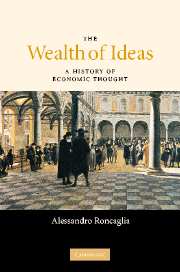Book contents
- Frontmatter
- Contents
- Preface
- 1 The history of economic thought and its role
- 2 The prehistory of political economy
- 3 William Petty and the origins of political economy
- 4 From body politic to economic tables
- 5 Adam Smith
- 6 Economic science at the time of the French Revolution
- 7 David Ricardo
- 8 The ‘Ricardians’ and the decline of Ricardianism
- 9 Karl Marx
- 10 The marginalist revolution: the subjective theory of value
- 11 The Austrian school and its neighbourhood
- 12 General economic equilibrium
- 13 Alfred Marshall
- 14 John Maynard Keynes
- 15 Joseph Schumpeter
- 16 Piero Sraffa
- 17 The age of fragmentation
- 18 Where are we going? Some (very tentative) considerations
- References
- Index of names
- Subject index
14 - John Maynard Keynes
Published online by Cambridge University Press: 22 September 2009
- Frontmatter
- Contents
- Preface
- 1 The history of economic thought and its role
- 2 The prehistory of political economy
- 3 William Petty and the origins of political economy
- 4 From body politic to economic tables
- 5 Adam Smith
- 6 Economic science at the time of the French Revolution
- 7 David Ricardo
- 8 The ‘Ricardians’ and the decline of Ricardianism
- 9 Karl Marx
- 10 The marginalist revolution: the subjective theory of value
- 11 The Austrian school and its neighbourhood
- 12 General economic equilibrium
- 13 Alfred Marshall
- 14 John Maynard Keynes
- 15 Joseph Schumpeter
- 16 Piero Sraffa
- 17 The age of fragmentation
- 18 Where are we going? Some (very tentative) considerations
- References
- Index of names
- Subject index
Summary
Life and writings
John Maynard Keynes was born in Cambridge, England, on 5 June 1883, the first son of John Neville Keynes (1852–1949) and Florence Brown (1861–1958). His father, a pupil of Marshall, was a scholar of logic and economics, author of The scope and method of political economy (1891), but had preferred an administrative career to prospects of a professorship, reaching the top of the Cambridge University administration; his mother was one of the first female graduates of that university, and the first woman to be elected mayor of Cambridge.
Maynard's curriculum was in keeping with the highest standards of the bourgeoisie: secondary school at Eton, university at King's College, Cambridge. Here he studied mathematics and classical humanities; he was also elected into the elitist secret society of the Apostles, devoted to ‘the pursuit of truth’. In a generation shortly preceding that of Keynes, another Apostle, the philosopher George Edward Moore (1873–1958), had rejected the utilitarian identification between ‘to be good’ and ‘to do good’, proposing an ethics of inner self-searching for truth and personal coherence. In the climate of cultural renewal characterising the Edwardian period, to Keynes and his friends this meant a radical reappraisal of Victorian culture and ethics, manifested also in their personal conduct (marked by extreme intellectualism and the pursuit of aesthetic pleasures), while, departing from Moore, they rejected the idea of general rules of conduct, substituted by confidence in the ability of the ‘elect’ to evaluate case by case what the right behaviour would be.
- Type
- Chapter
- Information
- The Wealth of IdeasA History of Economic Thought, pp. 384 - 415Publisher: Cambridge University PressPrint publication year: 2005

